The Good Trade editors endorse products we’ve personally researched, tested, and genuinely love. Learn more about our methodology and business model here.
We’ve spent the past ten years researching and wearing ethically sourced jewelry. These are our picks for brands with lab-grown diamond rings.
For those who are ethically and sustainably conscious, buying fine diamond jewelry can be tough — especially when you’re not sure where or how it’s sourced. One way to guarantee the traceability of your diamonds is to buy lab grown instead of naturally sourced. Whether you’re looking to buy something for yourself or a loved one, these lab grown diamonds are an ethical and sustainable choice without compromising on design for the ring you’ve been dreaming of. 💍
Why should you consider lab grown diamonds?
Traditional “natural” diamonds are often linked to unethical work practices and environmental concerns. Traditional mining and harvesting of diamonds have a history of fueling conflicts, sustaining unsafe and exploitative labor conditions like unfair wages, and contributing to environmental damage, including water pollution and soil degradation.
Both lab grown and natural diamonds are graded and certified with the same process from reputable gemological labs, like the Gemological Institute of America (GIA) and the International Gemological Institute (IGI). And while natural diamonds can be traced with things like the Kimberly Process, lab grown diamonds are inherently traceable because they are made in controlled environments with fair labor practices.
How are lab grown diamonds made?
There are two different processes through which lab grown diamonds can be made: Chemical Vapor Deposition (CVD) or High Pressure High Temperature (HPHT). CVD uses carbon gas to grow diamonds from a “seed diamond” in a controlled environment. HPHT creates lab diamonds by replicating the natural process in a controlled environment by exposing carbon to high pressure and extreme temperatures to form diamond crystals. This process has a smaller carbon footprint and less environmental disruption than the process of mining for natural diamonds.
What are the differences between natural and lab grown diamonds?
Lab grown diamonds are the exact same in their chemical, physical, and optical properties. Both contain the same cubic crystalline form of pure carbon. The difference is that lab diamonds can be produced in batches in just weeks to months, and natural diamonds form over millenia and must be mined. Natural diamonds are finite; there are only so many of them. Lab diamonds are infinite; they can continually be made.
Do lab grown diamonds cost less?
Lab grown diamonds are more affordable than natural diamonds because they are abundantly available and are made in batches. Natural diamonds are more expensive due to mining and rarity. One huge benefit of lab grown diamonds is that you can get more for your investment, so if you’re looking to buy more fine jewelry at a lower cost, lab grown diamonds might be a great option for you.
Our criteria
Our team has researched and tested dozens of fine jewelry brands, scouring thousands of customer reviews to find the best brands offering lab grown diamond rings. We’ve prioritized options that combine ethical sourcing, sustainability, and beautiful craftsmanship. We regularly update this list with new options that meet the following criteria.
- ETHICAL & CONFLICT-FREE | Each of these rings is composed of lab-grown diamonds and other ethically mined, recycled, or sourced gems and metals. We prioritized brands offering traceable supply chains.
- SUSTAINABLE PRACTICES | Our favorite brands invest in eco-conscious practices — from using recycled metals to carbon offsets and closed-loop recycling — and we’ve noted their initiatives in the list below.
- DESIGN & DURABILITY | Whether you’re looking for simplicity or something stunning, all of the rings on this list are made to be cherished for generations.
Looking for other ethical and sustainable jewelry options? Check out our guide here. Shopping specifically for ethical and sustainable engagement rings? We have a guide for that too!
1. Brilliant Earth
Best For | Custom diamond pieces
Ethics and Sustainability | FSC-certified sustainable packaging, recycled precious metals, gives back
Product Range | Engagement rings, wedding rings, earrings, necklaces
Price Range | $190-$100,000+
Brilliant Earth is known for its ethical and sustainable practices. It was one of the first brands to provide traceability for its conflict-free gems, and is a go-to for lab grown diamonds. The Capture Collection features diamonds made from carbon captured before it’s released into the atmosphere, a sustainable way to turn emissions from industrial processes into something beautiful both for the wearer and the environment. The Renewable Collection features lab diamonds made with renewable energy sources like wind and solar energy. All of the diamonds are stunning, quality, and high-end. Brilliant Earth is firmly against “dirty gold,” and instead supports a circular economy, using only repurposed precious metals. So when you go to set your lab diamonds, you can be sure they’re using repurposed silver and gold. Brilliant Earth also uses FSC-certified wood ring boxes and recycled materials for other packaging. They’re committed to sustainability from beginning to end, and it’s outlined in their annual sustainability reports, just an added layer to their outstanding commitment to transparency.
Our Editor’s Review | “The way Brilliant Earth beautifully blends sustainability, ethics, and technology into an experience that still feels elevated, even indulgent, is top-tier.” – Kate Arcero [Read her full review here.]

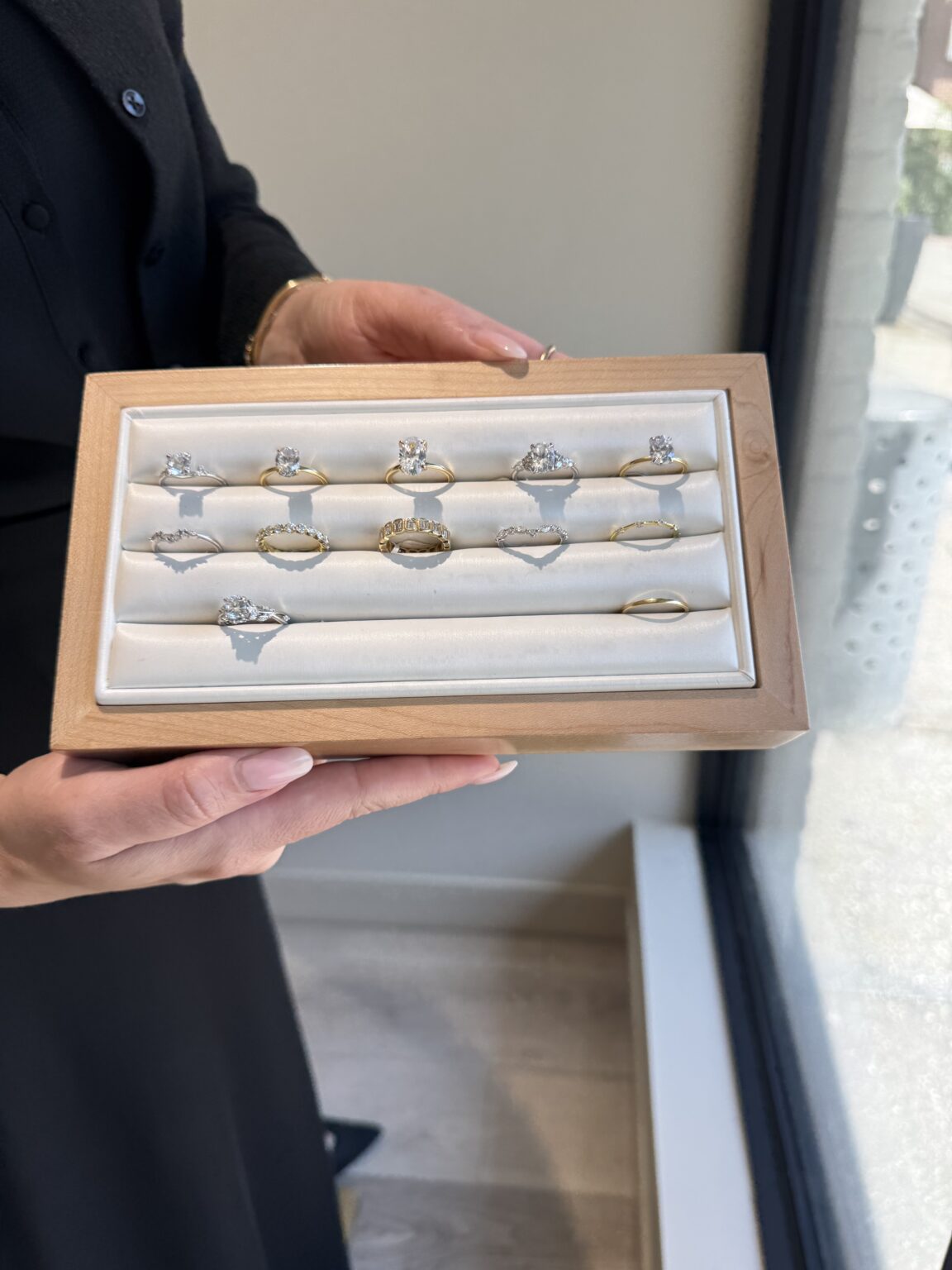
The Good Trade Partner
2. Aurate
Best For | Chunky and statement pieces
Ethics and Sustainability | Seventh-generation artisans, recycled gold, gives back
Product Range | Engagement rings, earrings, necklaces, bracelets, rings
Price Range | $218-$10,198+
NYC-based Aurate creates high-quality lab-grown diamonds that are affordable — that means no import taxes, no middlemen, no markups. Aurate works with trusted partners to source and cut lab grown diamonds at the lowest price. They’re generally cheaper than natural diamonds, but side by side they’re indecipherable. Aurate uses recycled gold that’s refined to remove impurities and imperfections. Their jewelry is crafted by seventh-generation craftspeople, and every ring comes with a certificate of authenticity. Aurate also gives back, supporting organizations like She Should Run, Mastery Charter, and Build NYC.
Customer Review | “I’m absolutely in love with these earrings—they’re the perfect classic piece. So versatile, I can wear them with anything. The lab-grown diamond sparkles beautifully too.” – Kaleigh G. (Read more reviews.)

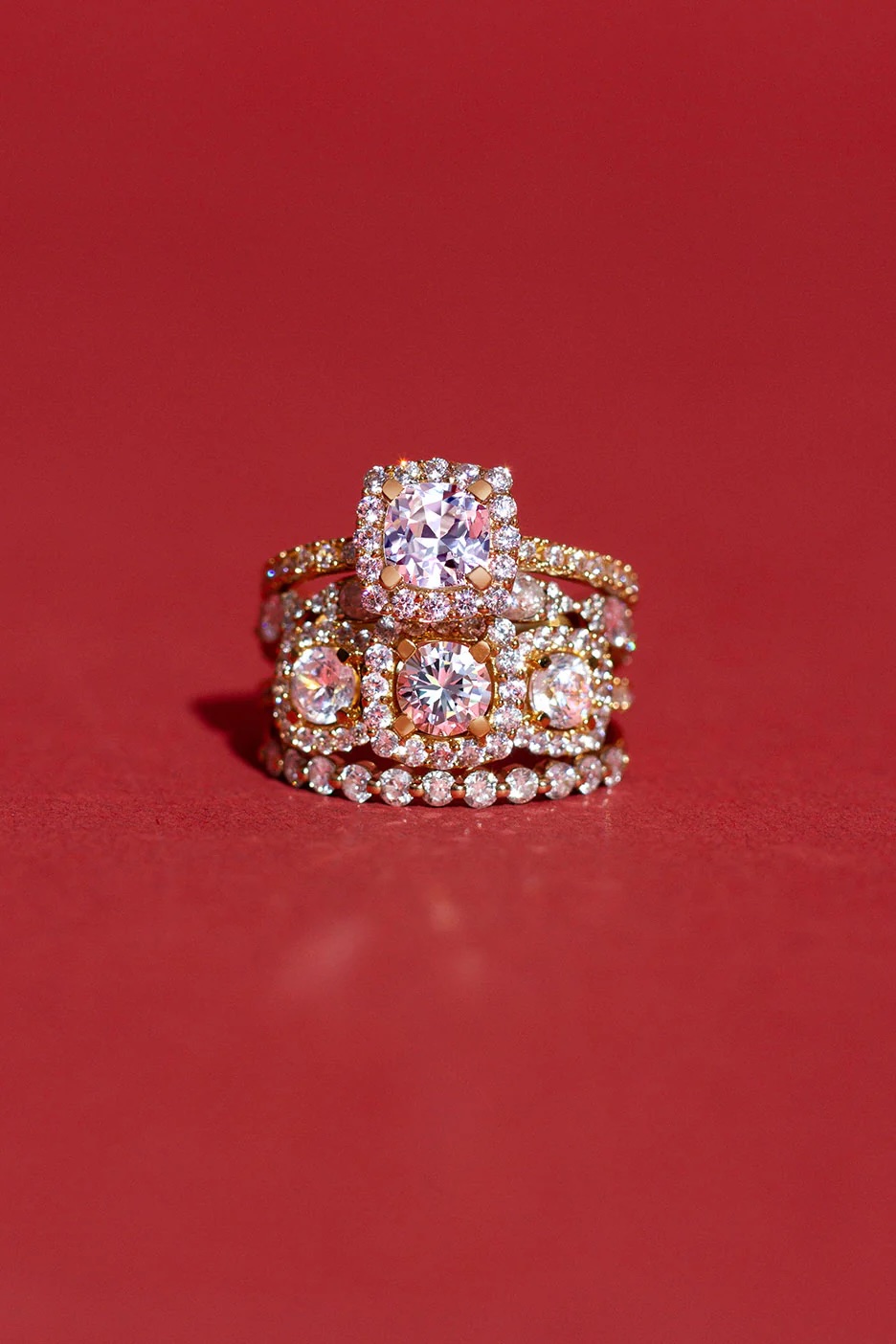
3. Blue Nile
Best For | Lifetime lab diamond upgrade
Ethics and Sustainability | Low-energy-use facilities, diamond upgrading
Product Range | Earrings, necklaces, engagement rings, rings, bracelets
Price Range | $1,660-$126,000+
Blue Nile has offered high-quality diamonds since they were founded in 1999, and they were one of the first online jewelry retailers. They offer many different lab grown diamonds at various price points. Blue Nile offers grading for many of their lab-created diamonds to bring transparency to the lab grown process. They handcraft their engagement rings and fine jewelry at their New York headquarters and are committed to low energy use in their daily operations. Blue Nile also offers a lifetime upgrade program for all of its GIA-graded diamonds, including lab-grown diamonds (it just must be a lab grown for lab grown trade in). They also offer a price match guarantee, 30-day returns, a lifetime guarantee, and diamond education and expert advice, available 24/7.
Customer Review | “Buying this pendant necklace was a great experience. The lab grown diamond with ideal cut looks amazing. It was nice to pick out the exact diamond we wanted and have it made into a necklace in time for my wife’s anniversary.” – Andrew K. (Read more reviews.)
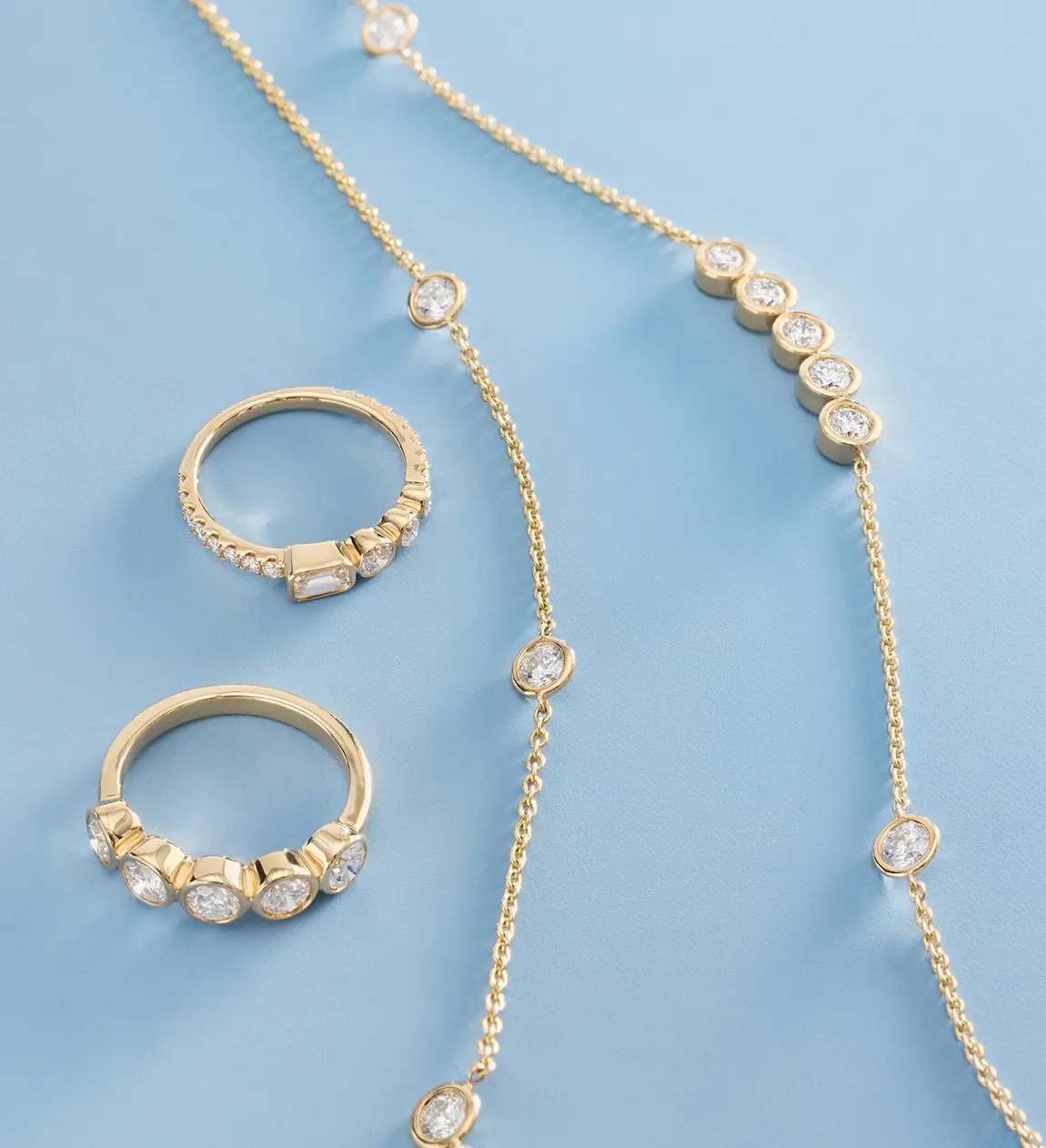
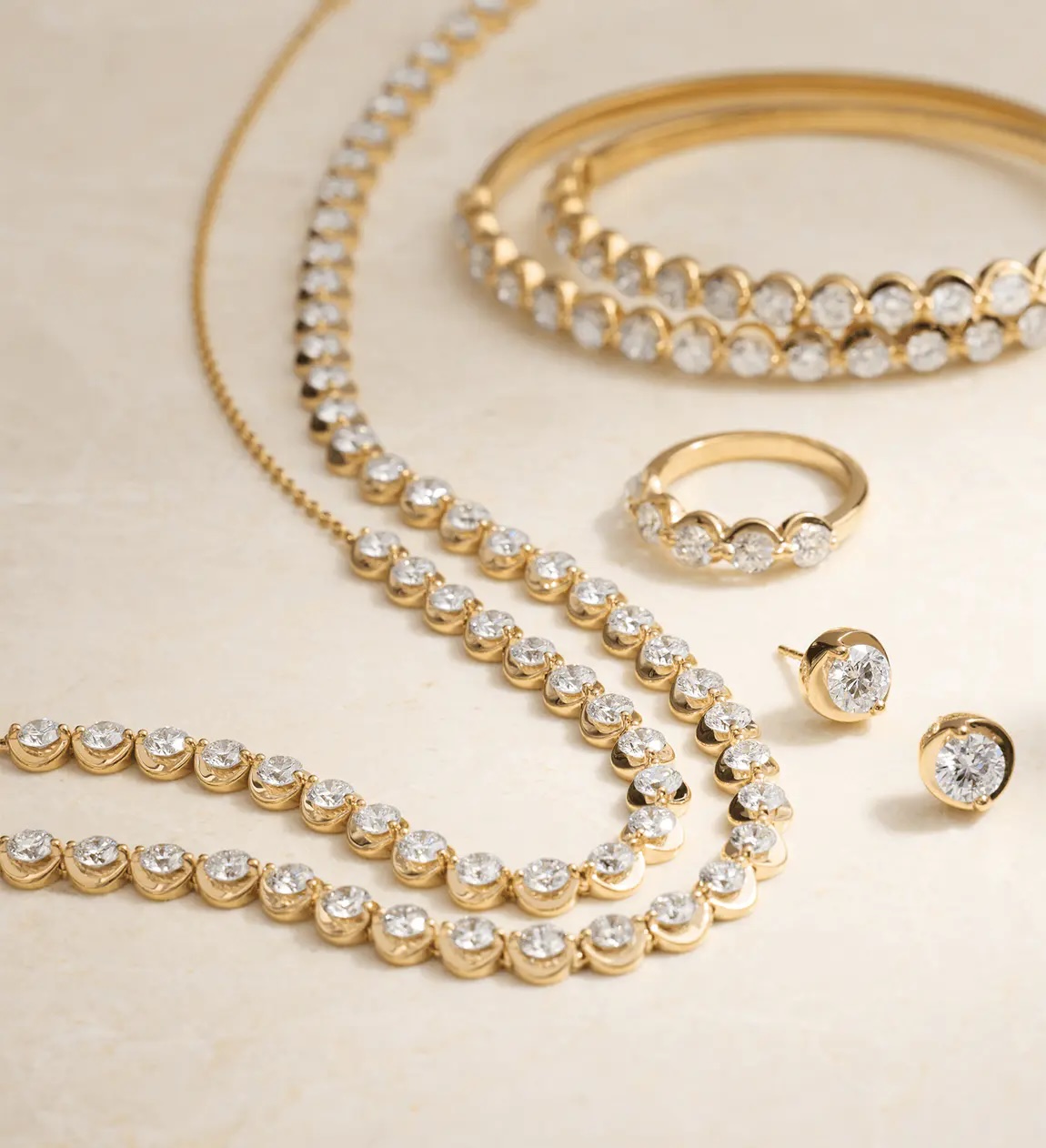
4. Bario Neal
Best For | Gender inclusive jewelry
Ethics and Sustainability | Reclaimed metals, fairmined gold, small footprint, gender-neutral & size-inclusive jewelry, gives back
Product Range | Earrings, engagement rings, necklaces
Price Range | $648 (earrings)-$3590+(engagement rings)
Bario Neal is a Philadelphia- and Brooklyn-based jeweler founded by designers Anna Bario and Page Neal. The woman-owned jewelry company is known for its quality handcrafted jewelry, commitment to supporting LGBTQ+ rights, and progressive manufacturing process. They offer gender-inclusive pieces, from engagement rings to earrings, using fairmined gold, reclaimed precious metals, and ethically sourced and/or lab grown diamonds. Only certain styles of their fine jewelry and engagement rings are available with lab grown diamonds, however, many of their pieces are highly customizable. They also offer custom jewelry, where you can decide the exact setting, metals, stone (including lab diamonds!), and more for your piece.


5. Linjer
Best For | Dainty, everyday pieces
Ethics and Sustainability | Recycled precious metals, carbon-neutral shipping, recycled packaging, minimal packaging option
Product Range | Earrings, necklaces, rings, bracelets
Price Range | $300-$3,000+
Linjer exclusively offers lab grown diamonds for its diamond offerings. Founded by Jennifer Chong & Roman Khan in 2014, Linjer is committed to sustainability and affordability, from selling direct-to-consumer (cutting out the middleman) and avoiding unnecessary mark ups. Their designs are made from high-quality recycled sterling silver and solid gold, and ethically-sourced pearls as well. And they’re made to last a lifetime. They also offset carbon emissions for all of their shipments to customers, and use recycled and FSC-certified materials for their packaging.
Customer Review | “It is a very beautiful necklace. I love the way the diamonds sparkle in the light. My new favorite!” – Laura D. (Read more reviews.)
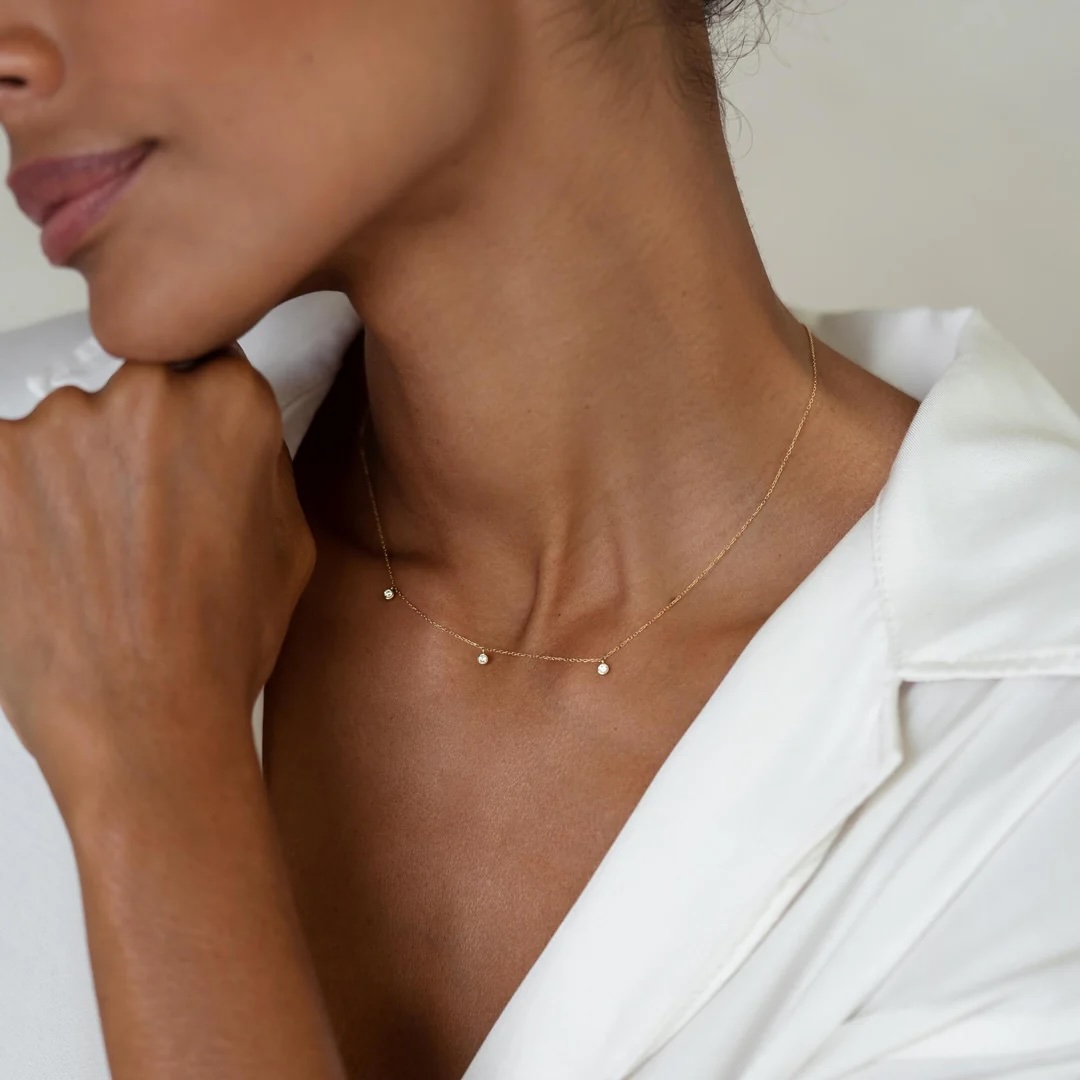
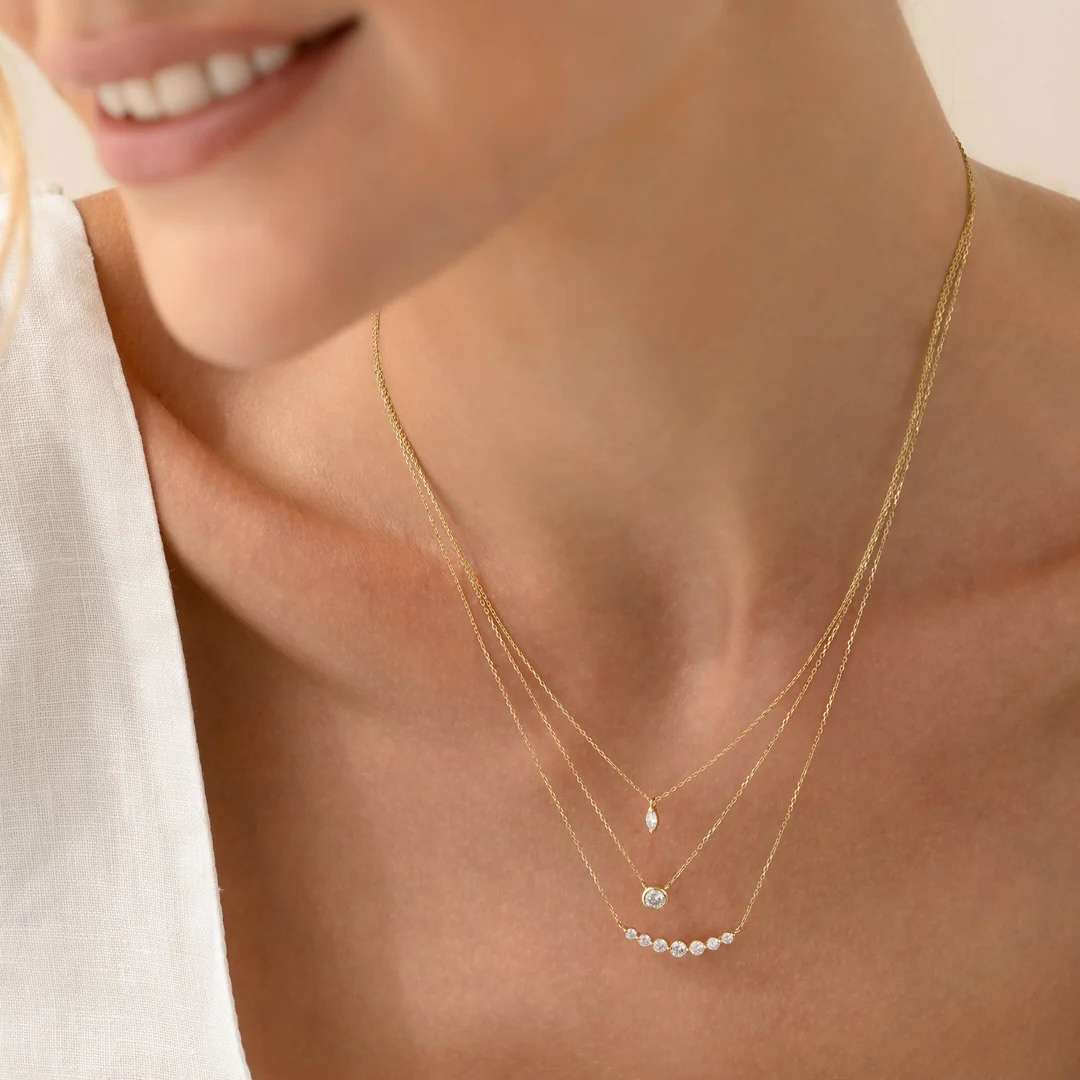
6. Mejuri
Best For | Affordable luxury pieces
Ethics and Sustainability | Responsibly sourced lab grown diamonds, carbon neutral lab grown diamonds, recycled gold & silver
Product Range | Earrings, necklaces, rings, bracelets
Price Range | $128-$4,700
Mejuri’s fine jewelry is meant to be worn by everyone, every day. They offer everyday pieces like rings, earrings, bracelets, and necklaces, but also engagement rings and bands for all genders, all handcrafted by specialty jewelers in Italy, South Korea, India, and more – and all without traditional industry markups. They have several lab grown diamond options, working with a trusted supplier network to offer net-zero lab grown diamonds. This means that they’re 100% traceable and responsibly made. The metals Mejuri uses with their lab grown diamond pieces are a mix of newly mined, lab grown, and recycled materials. Mejuri also gives back to women and nonbinary folks through its Empowerment Fund, and they continue to give back to other organizations like Indspire, Design Thinking Africa, and more.
Customer Review | “The bracelet fit my wrist perfectly. I have been wearing it nonstop since I got it and it has been almost half a year now. Still sparkly!” – Yvonne T. (Read more reviews.)


7. Quince
Best For | Fairly priced, timeless pieces
Ethics and Sustainability | Ethically sourced metals from RJC members, recycled gold
Product Range | Earrings, rings, necklaces, engagement rings, bracelets
Price Range | $348-$4,000
Quince is known for its affordable clothes, like $50 cashmere sweaters and washable silk, but they also offer fine jewelry made with real gold (mostly recycled!) and lab grown diamonds. Their jewelry is sourced from Responsible Jewellery Council (RJC) members, and it’s all traceable and responsibly sourced throughout the entire supply chain. The brand provides specifics on where each precious metal is sourced, and how pricing compares to other popular brands.
Customer Review | “This necklace delivers on everything promised. It is high quality and beautiful. I wear it daily and it is simple and ellegant. Highly recommend!” – Abby D. (Read more reviews.)


Brianna Schubert is a writer and editor based in Milwaukee, Wisconsin. She is a Contributing Editor at The Good Trade, an editorial assistant at Motley Bloom, and a freelance writer. She has a Bachelor of Arts in Journalism from the University of Wisconsin-Milwaukee. Since 2023, Brianna has combined her expertise and investigative skills to deliver thoughtful reviews of sustainable products and home goods, helping readers make informed, eco-conscious choices. Brianna is also the writer behind The Mood Board, a Substack newsletter for creativity and inspiration. When she’s not writing, you can find her cooking up a new recipe, reading and recommending books, cuddling with her cat, or yapping with her friends at a café. Say hi on Instagram!



